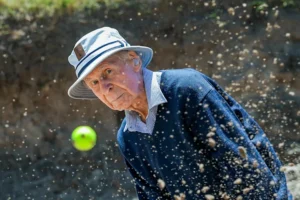
Australia’s illicit tobacco trade has exploded into one of the nation’s most violent and fastest-growing criminal markets, costing $4 billion in the 2023-24 financial year and helping push the total economic toll of organised crime to a record $82.3 billion.
Twin reports from the Australian Criminal Intelligence Commission (ACIC) and the Australian Institute of Criminology (AIC) reveal the economic impact of serious and organised crime jumped $13.6 billion in 12 months, fuelled by factors such as soaring black-market tobacco sales and increasingly brazen violence linked to turf wars.
Men charged over seizure of illicit tobacco
The $4 billion cost of illicit tobacco in 2023–24, through lost tax revenue, healthcare costs and reduced productivity, marks a four-fold increase since 2020–21 and cements tobacco as the second-largest illicit commodity market after drugs.
Speaking in Canberra on Thursday, ACIC chief executive Heather Cook said organised crime groups were waging violent battles for control of the lucrative tobacco and vaping trade.
She said the ACIC had linked criminal syndicates to more than 200 firebombings and at least three homicides including an innocent bystander since 2023, as well as widespread instances of extortion and intimidation.
“Billions of dollars in lost tax revenue means less money for hospitals, schools and essential services,” Ms Cook said.
Australia’s organised crime landscape is shifting rapidly. (Supplied: NSW Police)
“Organised crime syndicates then recycle these illicit proceeds into a range of other criminal activities, further impacting community safety, security and the broader social fabric.
“And the violence is not contained, it spills out into the streets, affecting bystanders and entire neighbourhoods.”
Authorities stress the $4 billion figure is conservative, as it does not include illegal vapes and e-cigarettes.
Since tighter vape restrictions were introduced in 2024, federal agencies have seized more than 10 million illicit vaping products, signalling what the AIC calls a “substantial and rapidly expanding market”.
A more corporate, digital and networked criminal economy
While illicit drugs remain the largest criminal cost category at $19 billion, the reports warn that Australia’s organised crime landscape is shifting rapidly, enabled by encrypted platforms, international supply lines and sophisticated financial networks.
Police record one of Queensland’s biggest tobacco busts
“Serious and organised crime is not a single syndicate or a shadowy figure in a back alley. It is a hidden web, complex, adaptive and ever-changing. Today’s criminal networks operate like multinational corporations,” Ms Cook said.
“They are not just ‘gangsters’ in the traditional sense. They are business people, technologists, opportunists. They embed themselves in legitimate industries, like construction, logistics, finance, even healthcare and recruiting, leveraging a range of trusted insiders.”
Despite this corporate veneer, street-level violence remains prominent. Turf conflicts and drug-related debt disputes have been linked to mistaken-identity killings, shootings and arson attacks, while drug-impaired driving has now overtaken drink driving as a leading cause of fatal road crashes.
Defrauding public programs and exploiting the vulnerable
The reports also highlight systematic criminal infiltration of government-funded support programs, particularly the National Disability Insurance Scheme, where vulnerable participants are coerced and funds siphoned off through sham services and kickbacks.
‘Contract criminals’ doing ‘dirty work’ for organised crime, police say
“In recent years, the ACIC has detected organised crime groups using incentive payments or ‘kickbacks’ to defraud the NDIS to the tune of millions of dollars,” Ms Cook said.
“…Organised crime also systematically defrauds government programs designed to help those most in need … The result is not just financial loss, but mental anguish for the victims and their families.”
The report identifies instances where serious and organised crime groups coercively control vulnerable NDIS clients, resulting in funds lining the pockets of criminals, while legitimate participants receive substandard services.
Victims are often people with limited English, disabilities and weak support networks who are groomed or pressured into signing over control of their plans.
Grooming a new criminal generation
A growing concern is the deliberate recruitment and grooming of minors, facilitated by social media and encrypted messaging, with teenagers coerced into transporting drugs, carrying out attacks or acting as lookouts.
“Perhaps most worrying is the recruitment and grooming of young people. Organised crime networks target minors for their unique value, they are cheaper to hire, more easily manipulated and more accessible online,” Ms Cook said.
New Sydney criminal group ‘G7’ raided
She said one notable group, which started as a youth gang in the late 2000s, has evolved into a major organised crime network, running independent drug ventures and illicit finance operations.
“The trajectory is clear: today’s youth offenders can become tomorrow’s high-threat syndicates,” she said.
The reports warn that while the harm caused by organised crime is growing, the nation’s intelligence, border and policing agencies are working “every day” to disrupt syndicates and seize illicit goods, noting recent drug and tobacco busts as proof of momentum.
Ms Cook said law enforcement alone cannot meet the challenge, calling for continued collaboration across government, industry and the community, along with public awareness to help resist criminal exploitation.
“Serious and organised crime is a national challenge, one that affects us all, whether we see it or not,” she said. “… But by working together, we can build a more resilient Australia.”





